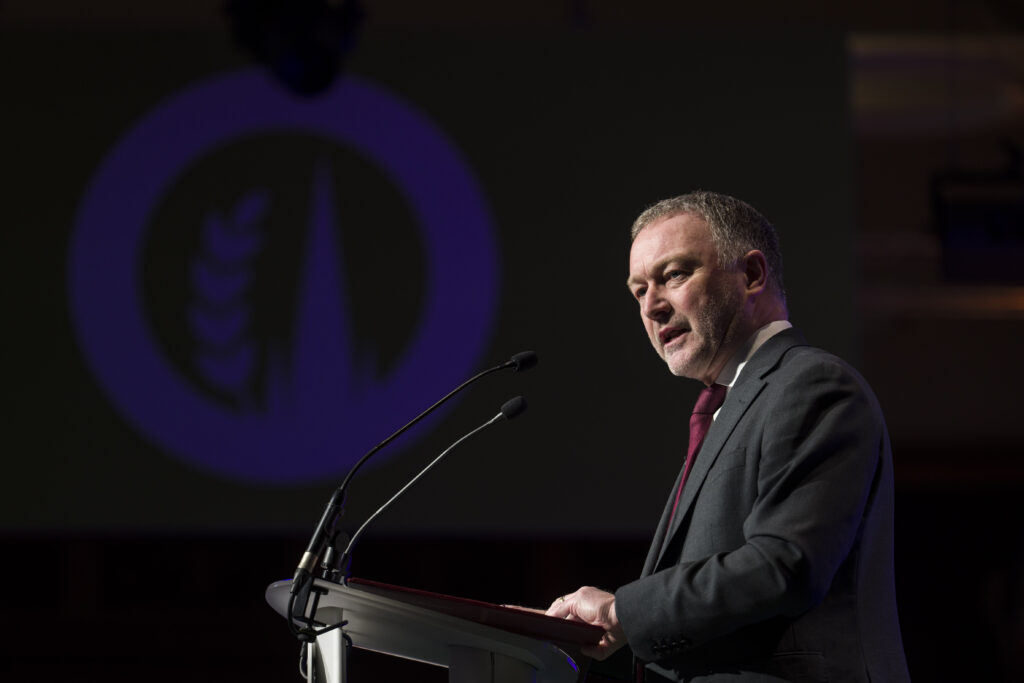Steve Reed’s OFC speech: Bold vision, unanswered concerns
 © OFC
© OFC Defra secretary Steve Reed presented his government’s long-term vision for UK agriculture at the Oxford Farming Conference, but his speech was met with widespread farmer dissatisfaction.
Farmers, frustrated by years of difficult policies, made their feelings clear both inside and outside the conference hall, with noisy tractor protests highlighting serious concerns over government plans to reform inheritance tax (IHT).
See also: Family farm tax protests overshadow Reed’s OFC speech
While Mr Reed outlined a new vision for a more profitable and sustainable farming sector, his failure to directly alleviate concerns over the farm IHT changes – due to take effect from April 2026 – was seen as a major oversight.
Apology for IHT changes, but no reversal
Mr Reed began by acknowledging the hurt caused by the government’s planned restrictions to agricultural property relief (APR) and business property relief (BPR), making it harder for farmers to pass down family farms without incurring substantial tax liabilities.
Despite offering an apology for the surprise this policy change has caused, Mr Reed stood firm on his government’s refusal to reverse it, blaming the £22bn fiscal deficit inherited from the previous Conservative government.
“We were shocked by the size of the black hole we were left to fill. I’m sorry if some of the action we took shocked you in return,” he said, claiming the difficult choices were necessary for long-term financial stability.
During a press conference, Mr Reed said some 12,000 farmers and food producers went bust under the Conservative government.
However, this did little to mollify farmers, who see these changes as a direct threat to the survival of family-run agricultural businesses, potentially forcing many to sell land or scale back operations.
Outside the venue, a convoy of 20 tractors displayed banners reading, “Honk if you want Starmer gone” and “Labour. We need you to stop killing British businesses”.

© MAG/Philip Clarke
Prominent voices in the farming community, including Oxfordshire farmer and former conference chairman Tom Allen-Stevens, pointed out that farmers are often asset-rich but cash-poor, so the IHT levy would be unaffordable for many.
“Steve Reed’s biggest mistake is that he has not been listening to farmers,” said Mr Allen-Stevens.
“He is not doing enough to put farmers’ case to chancellor Rachel Reeves. We are not a wealth pot to plunder.”
He also noted that the government’s £5bn budget commitment to farming over the next two years was the lowest in real terms and shortest in living memory, especially considering inflation.
The NFU was equally vocal, with president Tom Bradshaw pledging to continue the fight against the “family farm tax”.
At a press conference, Mr Bradshaw stressed that the emotional and practical toll on older farmers, who had dedicated their lives to food production, was being ignored.
He also lamented the lack of dialogue with the Treasury on IHT and pointed out the disconnect between the government’s promises and the realities on the ground for farmers.
Labour’s ‘new deal’
Mr Reed instead chose to focus on his government’s vision for a “new deal” for UK farming, emphasising profitability, sustainability and diversification.
He committed to strengthening food security by prioritising domestic food production, essential for a resilient food system.
Mr Reed also highlighted opportunities for farmers to diversify into renewable energy, tourism and other ventures to build financial resilience.
He reaffirmed Labour’s pledge to source at least 50% of food for public sector institutions from local producers, and promised support for farm diversification, including planning reforms and improved grid connections for renewable energy.
However, farmers took issue with his suggestion that they should diversify to remain viable, arguing that many had already done so and criticising the lack of concrete solutions to key challenges.
Mr Reed also confirmed secondary legislation for the Precision Breeding Bill, set for March 2025, which would allow gene-edited crops for improved yields, pest resistance and sustainability – a move applauded by OFC delegates.
Despite these initiatives, many farmers remained unconvinced, as the speech failed to address immediate concerns such as the fast-track withdrawal of the Basic Payment Scheme in England, rising costs, and increased taxes on fertiliser and vehicles.
A poll on X by Hertfordshire farmer Tom Martin found that 68% of respondents were less optimistic about the future of farming after hearing Mr Reed’s speech.
One speech, Steve, and over two thirds of farmers surveyed are feeling less optimistic about the future of UK farming. Press the button; reverse the IHT changes. Get Rachel back from holiday; we can’t go on like this. #OFC25 @SteveReedMP @sam_carling_ pic.twitter.com/PBqiNDH7Zu
— Farmer Tom ? ?? (@Farmer_Tom_UK) January 10, 2025
A shift from last year’s speech
This year’s speech contrasted starkly with Mr Reed’s 2024 address, which focused on a post-Brexit vision and significant investments in sustainability.
Last year, farmers were cautiously optimistic about a future Labour government, but this year many have been left disappointed, particularly by the intransigence on IHT.
Farmers questioned whether the government understood the urgency of their situation and could be trusted to deliver on its promises amid mounting financial pressures.
Looking ahead
As the protests outside the venue highlighted, the farming community’s concerns remain unresolved.
It is uncertain whether the government can bridge the gap between its policy vision and the cashflow crisis engulfing the industry, which, as Mr Bradshaw stated, is “on a knife edge”.
If Mr Reed’s vision is to become a reality, his government will need to address the IHT issue in a way that restores confidence and trust among farmers.
Plenty of suggestions were made at the conference on how to achieve this, such as exempting older farmers, raising the APR threshold, or delaying IHT until an actual land disposal is made.
Without such concessions, the mood in the farming community is likely to remain one of deep scepticism, with many questioning whether the government is truly committed to supporting British agriculture.
Five key pledges in Reed’s speech
- Supporting British food production The government aims to source 50% of food used in public sector institutions locally or sustainably
- Farm diversification Supporting farmers in diversifying businesses, including renewable energy projects
- Technological innovation Investment in the Farming Innovation Programme to support sustainable technologies, as well as precision breeding for better crop resilience, pest resistance and nutrition
- Flood resilience £2.4bn for flood defences and improved infrastructure planning
- Nature and sustainability £5bn over two years to help English farmers transition to nature-friendly farming practices
